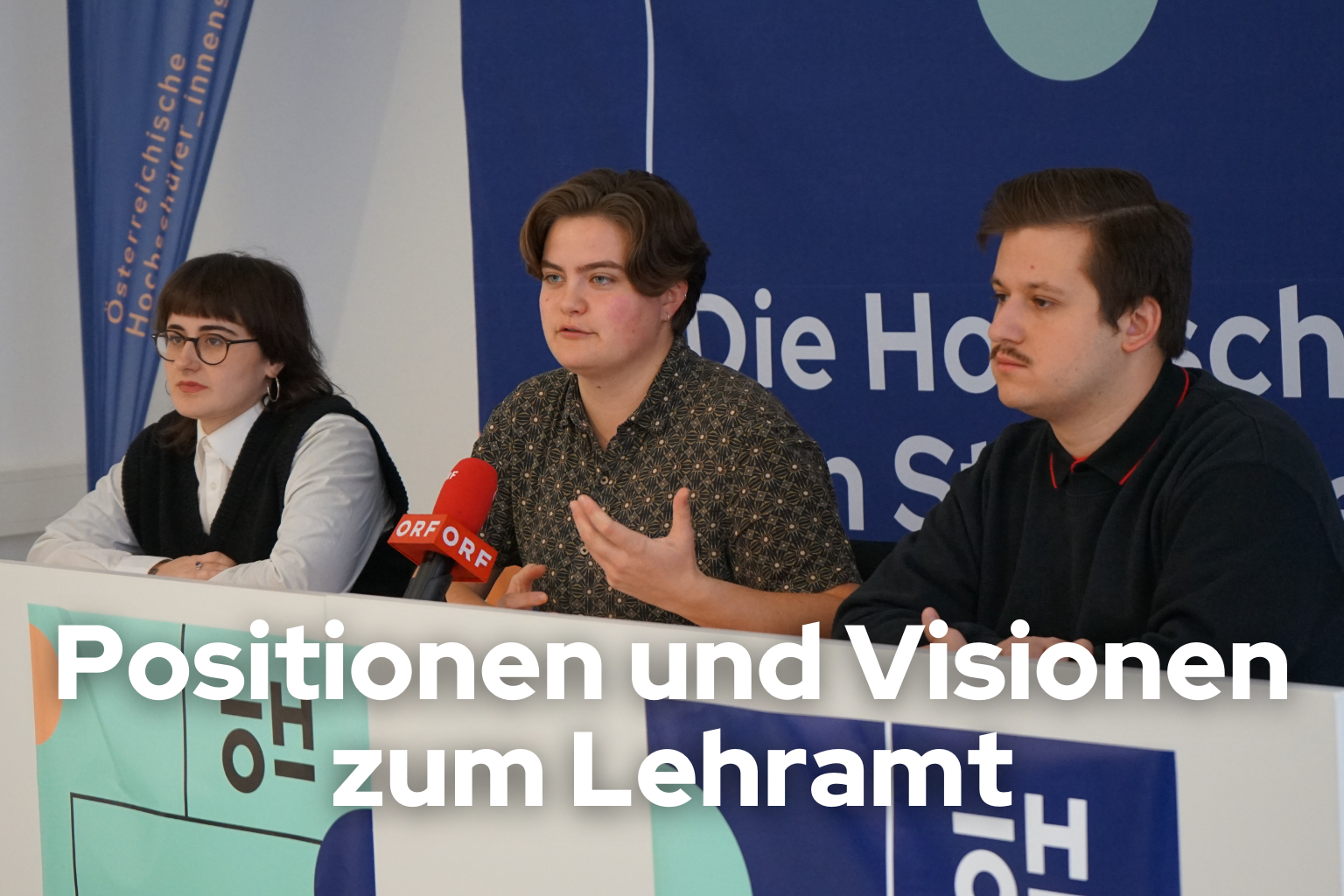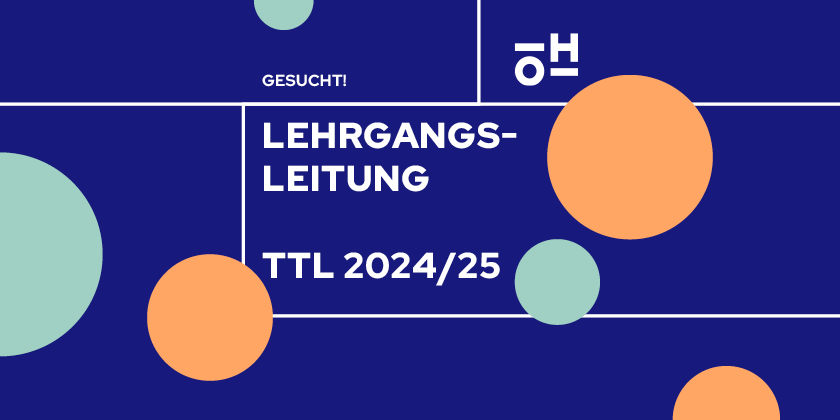Fighting for the education of tomorrow!
Position and vision paper of the ÖH on the teaching degree and reform:
1. Introduction
Society is currently facing the biggest challenges in decades, and overcoming them is fundamentally linked to the design and quality of our education system. However, the Austrian educational landscape has long resembled an arid desert. Changes are often limited to minor cosmetic corrections that cannot solve the structural problems and shortcomings. Instead, the education system needs visionary approaches and reforms from politicians in order to guarantee future generations the best school education and teacher training. The future of our education depends to a large extent on the quality and professionalism of our teachers, and it is our responsibility to ensure that they receive the best possible training and support.
The current shortage of teachers is due to decades of failure on the part of politicians to take timely measures and generally upgrade teacher training and the teaching profession. It is imperative that the shortage of teachers is addressed quickly in order to provide current pupils and teachers with a sufficiently high-quality learning and teaching environment and to avert the worst consequences of the flawed policy. Nevertheless, we are calling for visionary foresight in future reforms that is not limited to closing current gaps in the system. We see education as the foundation of an enlightened society and an emancipatory future to which all people must be freely entitled. Children and young people deserve the best education, student teachers the best training, teachers the best working conditions and each of these groups deserve a policy that takes their concerns seriously and designs a fair education system for the future.
As the ÖH, it is particularly important to us to help shape the Austrian educational landscape and to point out weaknesses in the system. As representatives of all student teachers in Austria, we would like to use this position and vision paper to highlight problems in the current teacher training program and outline solutions that can contribute to improved study conditions and a more equal educational landscape.
2. Timetable and aim of the teacher training reform
With the so-called Pädagog_innenbildung NEU (PBN), the teaching degree was fundamentally reformed only a few years ago and adapted to the Bologna study structure. The Bachelor’s degree program for primary and secondary education now comprises 240 ECTS credits (four years), followed by a one-year Master’s degree in primary and secondary vocational education and a two-year Master’s degree in secondary general education. The teacher training course is now to be reformed once again, with plans to shorten the course by introducing a three-year Bachelor’s degree followed by a two-year Master’s degree at both primary and secondary level due to the current shortage of teachers.
As ÖH, we firstly criticize the current uncertainty and delays in connection with the teacher training reform. Education Minister Martin Polaschek’s promise to give his fragmentary announcements and ideas a legal basis before the summer of 2023 was broken and postponed until the fall of 2023. We are still waiting for concrete information on the planned reforms. In order to give students, prospective students, universities and interest groups planning security and to guarantee the implementation of the reform in the foreseeable future, clarity and a precise timetable are finally needed. It must now be assumed that the new curricula in all teacher training programs will start in the winter semester 2025/26 at the earliest, and probably not until the winter semester 2026/27; this already means a delay of one to two years compared to the original plan.
For many students and prospective students, the current state of waiting is an immense deterrent. We have to assume that at the moment some are at least thinking about delaying the start of their teacher training course in the hope of a shorter course if they wait another year or two. Instead of making contradictory and imprecise announcements and stirring up uncertainty, the federal government must finally present a concrete plan for teacher training reform!
We are therefore calling with the utmost urgency for the draft bill on teacher training reform to be submitted before the end of 2023!
Despite the urgent need for action, the ÖH would like to call for sufficient time to be given to the process in the curriculum commissions and steering groups of the development networks. Students are represented on these committees and their involvement in the development of new curricula is essential.
In the view of the ÖH, the aim of the reform must not be to make hasty changes and concentrate purely on shortening the duration of studies. We expect a focus on comprehensive changes and improvements that generally increase the quality of teacher training programs and do not impose “one-size-fits-all” approaches on all teacher training programs. The upcoming reform must be seen as an opportunity to learn from the (mis)successes of the PBN and to develop an attractive and high-quality teacher training program for the future.
3. Duration of study
Opinions on the duration of teacher training courses could not be more different. However, one aspect that is neglected in this discourse is the fact that students are still being denied access to teacher training courses due to admission procedures. As the ÖH, we take a critical view of this and are strongly opposed to any kind of access restrictions.
It would be conceivable to shorten the Bachelor’s degree course in LA Primary Education to a duration of 6 semesters with 180 ECTS, as this would achieve a sensible standardization with other degree courses. In addition, a shorter duration of study makes the course more attractive and could therefore lead to more new students. In the case of the reduction in the Bachelor of Secondary Education, on the other hand, we need to take a more cautious view of the overall situation of students. Secondary school teacher training students are in fact studying three courses at the same time and must have enough time to do so. However, experience reports show that it is also possible to shorten the duration of studies at secondary level. Furthermore, abolishing the combination requirement could be a way of reducing the course to 6 semesters. First-year students should therefore be given the option of studying two subjects for 8 semesters or just one subject for 6 semesters. This gives students a choice and gives them enough time to complete their studies.
As ÖH, we demand a duration of study of 3 years for the Bachelor’s degree and 2 years for the Master’s degree in both primary and secondary education. Furthermore, we call on the government to consider abolishing the compulsory combination at secondary level.
Shortening courses can often mean that ECTS credits are cut, but the workload for us students remains the same. We clearly reject this. As the ÖH, we demand that there must be clear regulations and an adequate revision of the curricula for this. We students know best which content is relevant for future professional life and must be included in curriculum development. The course must not lose quality as a result of the shortening and, above all, we see the retention or expansion of practical experience as essential. The Master’s degree course should offer the opportunity to specialize and not simply repeat the content of the Bachelor’s degree course. In addition, clear transitional regulations are needed for students who are currently studying for a four-year Bachelor’s degree. These should include the possibility for students in the four-year Bachelor’s program to switch to the three-year program or, if they wish, to complete the four-year program and graduate.
In our opinion, the Master’s degree should last 4 semesters in all teacher training programs. Here, attention must be paid to a sensible part-time option, not “career-enabling”, as was the case in the past. Bachelor’s degree graduates are being pushed into everyday school life earlier and earlier and in return do not even receive any meaningful professional support in a compulsory Master’s degree program. In the best case scenario, Bachelor’s graduates only start their teaching career in their Master’s degree and start with an accompanying teaching internship and additional practical courses. The aim is toenable students to make a smooth transition into the teaching profession .
4. Master’s requirement
The obligation to obtain a Master’s degree within eight years of initial employment or completion of the training phase, as currently stipulated in § 48 (1) of the Contract Staff Act (VBG), means that many young teachers are under enormous pressure to perform. This is due in particular to the fact that the Master’s degree courses in teaching are not designed to be sufficiently part-time. As the ÖH, we are therefore calling for the introduction of Master’s programs that are actually part-time and whose course times are actually compatible with the teaching profession. A strict Master’s degree requirement is often a major hurdle, especially for students with caring responsibilities. In times of teacher shortages, the question also arises as to what actually happens if people do not complete their Master’s degree within the specified time. Often, however, no dismissal is issued by the Education Directorate, but the teacher concerned lives with the constant fear of being dismissed at any time.
In order to actually be able to justify a compulsory Master’s degree, some changes to the content of the Master’s curricula are needed in addition to the more flexible design. At present, these often consist of a lot of repetition of the Bachelor’s subject matter. As the ÖH, we believe that a compulsory Master’s degree only makes sense if students can actually specialize in their preferred subject areas and if the Master’s thesis can be designed in a more practical way.
In its current form, we as the ÖH are therefore calling for the abolition of the compulsory Master’s degree!
As the ÖH, however, we also recognize the major contribution that the compulsory Master’s degree makes to upgrading the teaching profession. In this area in particular, it is important to see the reform of the teaching profession as an opportunity for major restructuring. The Master’s curricula should be designed in such a way that they represent an ideally supervised entry into the teaching profession. With a well-supervised career entry, real career support, practical courses, specializations and a real-life Master’s thesis, the Master’s courses can be significantly upgraded and made more meaningful. In this form, the eight-year period would also be conceivable for us, although it would have to be extended to include generous exceptions (e.g. in the case of pregnancy, illness in the family, caring responsibilities). If the Master’s degree is obtained too late, but during a valid employment relationship, the lifelong reason for termination must be dropped.
For secondary level general education, the ÖH has long been calling for the examination and development of a study model that enables teaching at secondary level I with a Bachelor’s degree and no longer requires an additional Master’s degree. In this way, prospective students who only want to teach at lower secondary level could also be encouraged to study to become teachers.
5. Curricula
We finally need a visionary view of our curricula at university and at school. Changes in the teaching profession must also mean changes in our curricula, because it is unacceptable that for years hardly any attention has been paid to essential things such as classroom management, parental work, lesson and annual planning or various other administrative activities in the teaching profession. In addition, more space must be given to addressing mental stress in everyday school life. Teachers are one of the professional groups most affected by burnout, and coping strategies and preventative measures are hardly or not at all covered in their studies. Anti-discrimination must become a practice, also in our schools. Future teachers need to know how to recognize injustice and discrimination in everyday school life and how to act sensitively against it. Much more space must be given to subject-specific didactic content in secondary school studies, and the possibility of free ECTS credits must be created, as is already possible in other studies.
In addition to the changes in the curricula, ECTS credit transfer must be standardized. It is unacceptable for students to have to worry about whether their achievements will be recognized when they switch to a new degree program. In general, the network structure makes no sense in our eyes and should no longer exist in the future. There is no reason to have different networks throughout Austria, even though we have a uniform school system with the same curriculum. ECTS equity must also be a top priority, especially at secondary school teacher training level, where teacher training students currently often receive fewer ECTS credits for the same course than students in the same subject area. Student teachers deserve equal recognition for equal performance!
6. Internships
Internships are an essential part of a student teacher’s training and their first insight into their future professional life. As a result, students spend a lot of time preparing, planning and following up on lessons and perform similar tasks to teachers. And completely unpaid! As the ÖH, we demand fair pay for internships so that nobody has to work unpaid anymore.
No work experience without internships, no degree without internships! It is therefore essential to guarantee that there are enough internships available, especially at secondary school level. It is unacceptable that students have to commute for miles to complete their internship. Furthermore, there is a need for uniform regulations regarding the recognition of internships that do not make any differences between the associations.
7. Career entry
Especially in times of teacher shortages, the Austrian education system is dependent on many student teachers who start their teaching careers during their studies. As the ÖH, however, we can observe many different problems here, which could lead to an even greater shortage of teachers in the future if they continue to worsen. Many young teachers who are still studying for a bachelor’s degree are overwhelmed by the additional workload, suffer from pressure to perform and are increasingly working themselves into burn-out. This tense situation, which is often accompanied by premature drop-outs and career changes, must be taken into account in the upcoming teacher training reform. In particular, the ÖH considers it unacceptable that student teachers who maintain the education system in the teaching profession have to pay tuition fees and may lose financial aid due to longer study periods.
In concrete terms, this means at least the following measures, which should be implemented immediately :
- Maximum limit for the maximum teaching commitment during a Bachelor’s degree course, so that students cannot be forced to work ever greater numbers of hours in the teaching profession. However, this should also include exceptions for those students who actually need more money alongside their studies.
- Same salary as lateral entrants (95%)
- Reduction of compulsory course attendance to 50% for students in the teaching profession
- Cancellation of tuition fees for students in the teaching profession
- Additional semester of tolerance per semester in the teaching profession
Despite the current shortage of teachers, we would like to urgently warn the federal government against putting students into the classroom as soon as possible! In our view, a future-oriented and sustainable education policy must aim to ensure that student teachers can concentrate on their studies during their bachelor’s degree. Taking the teaching profession seriously in terms of its professionalism and responsibility also means formulating entry into the profession as a goal only after completing teacher training.
For an ideal career start, we as the ÖH are calling for the reintroduction of the teaching internship that was replaced by the induction phase with the PBN. The supervision ratio in this central phase must be radically reduced in order to actually be able to guarantee students individual supervision. It is essential that student teachers actually teach their subjects during the teaching placement and are supervised by subject-specific teachers. The accompanying courses must be practice-oriented and prepare students optimally for challenges such as annual and lesson planning, administration or parental work (see chapter 5).
With regard to the summer school, we as the ÖH are also calling for far-sighted political measures that do not make its organization dependent on countless student teachers or even require student teachers to attend in the future. Especially as many students work full-time elsewhere in the summer to finance their studies, summer school must remain a voluntary option. As the ÖH, we continue to demand the same pay for student teachers as for teachers, only subject-specific assignments for students and good supervision during the summer school. There is also a need for clear and enforceable regulations regarding the reimbursement of material costs, as students are far too often left with the costs of preparing for lessons. We consider the omission of a practical semester for students completing the summer school to be the wrong step, as the summer school is a completely different experience to the practical part of the degree course due to the different class constellations and cross-curricular and cross-grade teaching. By making the curriculum more flexible, students should be able to have the summer school credited as an optional subject with 5 ECTS credits instead of not having to do the practice.
8. lateral entry
Due to the current shortage of teachers, our schools are currently reliant on lateral entrants. As the Austrian National Union of Students, we are extremely critical of this measure by the Ministry of Education, but understand that it will not work at the moment without support in the classroom. However, the aim of a future-oriented education policy should be to make studying so attractive that there is no need for lateral entrants.
The entry of lateral entrants must not be made too open in the future, as this would further devalue the teaching profession and the entire course of study. There is a need for uniform regulations on how lateral entrants are allowed to start. In our opinion, these should include close observation of lateral entrants in their first year of service and, in parallel, a university course to provide them with space to reflect on their teaching units. In addition, the basics of pedagogy and didactics must be completed before starting lessons.
In times of lateral entrants, it must also be clearly stated that they must not be given preferential treatment at school locations. Teacher trainees and graduates must always have priority and no differences should be made in terms of pay. We therefore demand the same remuneration for bachelor’s degree teacher trainees as for lateral entrants (95%).
9. Working conditions
Hardly any other course of study offers such a predictable career path as the decision to study to become a teacher. Better study conditions for student teachers lead to a better school day, just as poor working conditions in schools discourage and demotivate students. It is therefore clear to us as the ÖH that the working conditions for teachers must improve across the board and in the long term in order to actually secure the education of tomorrow. As the anchors of our education system, teachers deserve to be valued and respected, which is also reflected in their working conditions. Our demands are part of an endlessly long and old list of measures and proposals that have often been formulated by interest groups for years and are unfortunately often ignored.
As ÖH we demand :
- Better pay as appropriate monetary appreciation for this key professional group
- More administrative, legal and psychological support staff at schools to relieve teachers of workload and bureaucratic tasks
- Conception of alternative school models that go hand in hand with more flexible working hours and shorter working hours
- Permanent instead of special contracts
- No teaching of other subjects
- The 20/20 model (20 children, 20 hours) as a long-term goal in all schools
- Strengthening school autonomy
10. Conclusio
In this position paper, we as the ÖH have highlighted many problem areas in teacher training, ranging from long study periods and inadequate career preparation to premature career entry. We call on the federal government to finally present a draft bill for the planned teacher training reform so that student teachers are no longer left in uncertainty. In addition to shortening the duration of studies, this reform must also entail many other large-scale changes to the current education system. Teacher trainees must learn practical content and also be confronted with ideal working conditions at schools later in their careers. In addition, visionary education policy means not overburdening Bachelor’s students with an early career start and thus generating the teacher shortage of tomorrow. Regulations on compulsory Master’s degrees and lateral entry must be clearly defined and must not result in any disadvantages for student teachers.
Student teachers are the key to the education system of the future. We demand that our concerns are taken seriously and that we are sufficiently heard and supported. The teacher training reform must be seen as an opportunity to secure the education of tomorrow!





